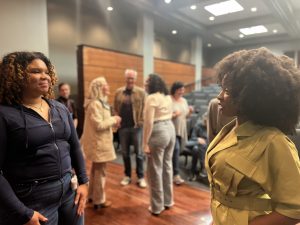Brittany Brown, a journalist for MLK 50, and freelance photojournalist Ariel Cobbert, who has been working for CNN, are no strangers to covering tough stories, but the January 7 death of Trye Nichols after a violent traffic stop involving Memphis police has been especially difficult.
“For both of us, as Black women from Mississippi, from the South, we’re reporting on things that affect our community. This isn’t a matter of [us getting] to go home and take off this journalism suit,” said Brown.
Brown discussed the importance of journalists being fair and just in their reporting. She debunks the myth of complete objectivity that Black media workers are often expected to uphold as they cover painful times in their respective communities. She also adds that Black reporters take cases like the killing of Tyre Nichols personally.
“We’re still living and operating in a world that, at any given moment, we can be the victims of police violence,” said Brown.

Photojournalist Ariel Cobbert speaks with a student about covering the Tyre Nichols case. Photo by Jaylin R. Smith.
Cobbert added her photojournalistic expertise to the conversation by explaining the pride she takes in being respectful and empathetic in the images she captures.
“I knew not to photograph certain things. I really don’t photograph minors at [protests]. I normally try to photograph organizers that the police already know,” said Cobbert about trying to minimize harm with her work.
She stated that ethics are important to her work as a photojournalist, and in covering the Nichols case, she refused to take gory photographs. Instead, she captured images that helped the audience understand where the events took place.
The two spoke as part of a presentation at The Overby Center for Southern Journalism and Politics on the University of Mississippi campus, where both women graduated from the School of Journalism and New Media. Prof. Alysia Steele, an award-winning photojournalist herself, moderated the conversation and allowed the panelists to unpack their experiences as Black women in the media.
The women spoke about the duty they have to protect themselves as well as the communities they are representing. In the midst of the Memphis protests, for example, Brown and Cobbert planned ways to stay safe and support other journalists.
“We made a game plan. ‘If things get bad, where are we going to meet up?'” said Cobbert.
Brown explained that journalists are vital to communities because they hold governing bodies accountable, a role particularly important in the Nichols case.
“We are the first line of defense between public officials and the general public.”






